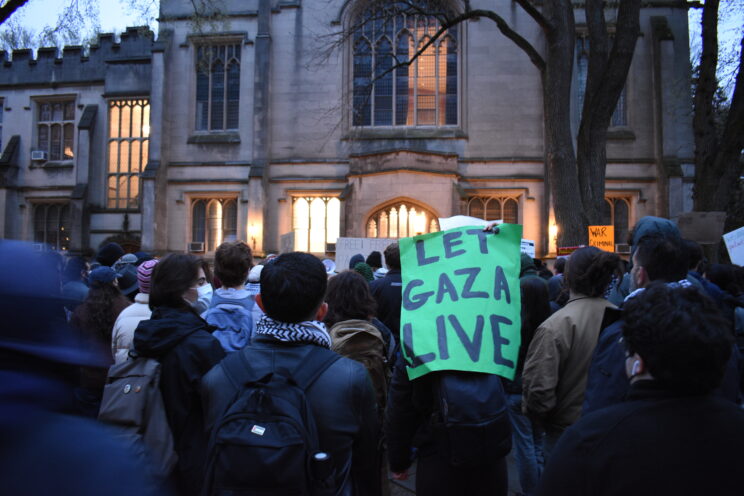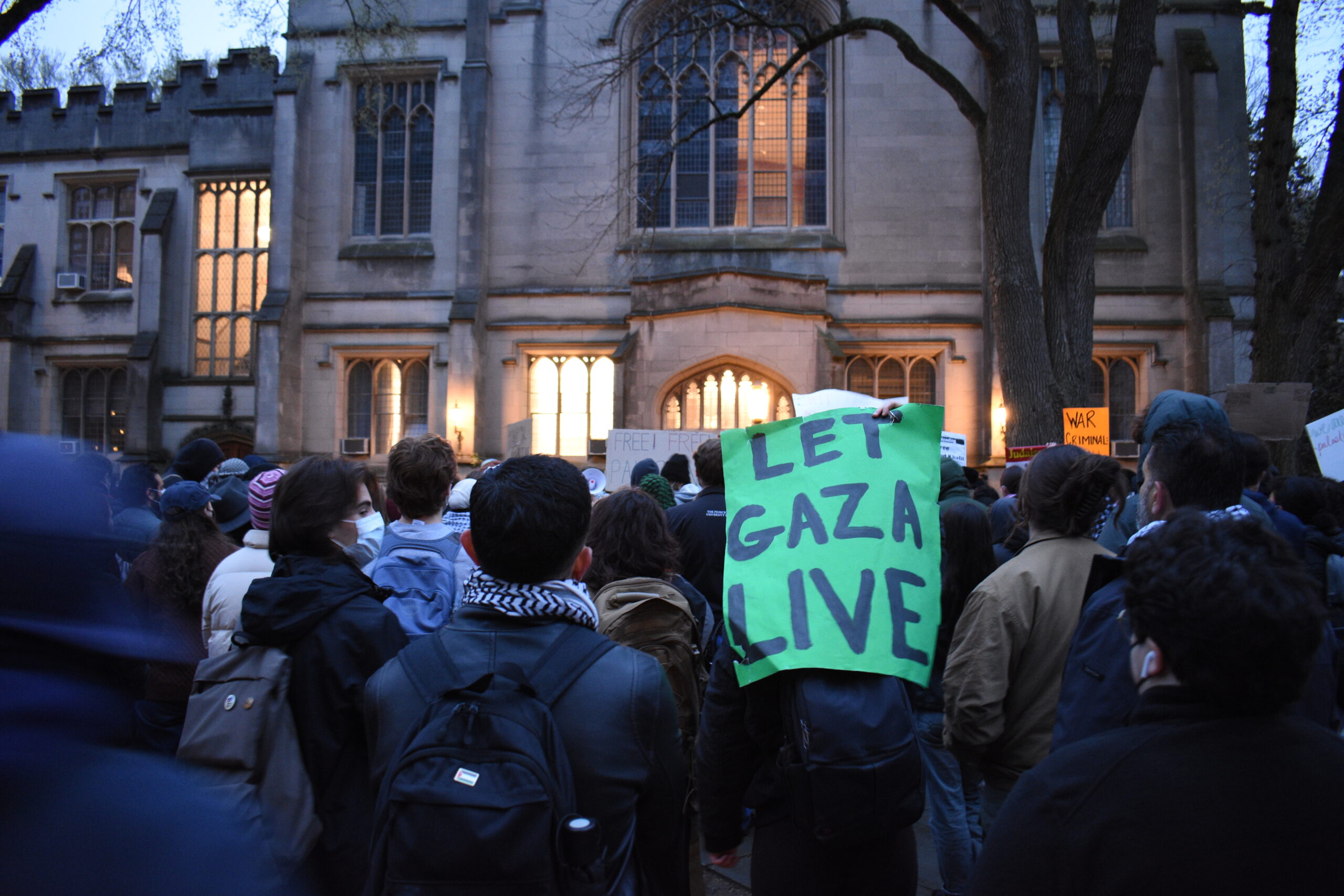Thick clouds choke the sky above McCosh Hall. A few students emerge from behind the large wooden double doors. They stop in front of the door and gaze out at the crowd of protestors gathering behind a large white fence. “Shame!” the crowd chants, directing their ire at the event about to begin in the lecture hall. The students giggle and record the protestors outside until they are herded back into the building by the event organizer. The protestors, many of them wearing masks, hold up cardboard signs that read a quote from Naftali Bennett, the man to speak at the night’s talk: “I’ve killed many Arabs in my life and there’s no problem with that.”
“A Conversation With Naftali Bennett,” an event only open to Princeton students and affiliates, was moderated by Rabbi Gil Steinlauf, the Executive Director of the Center for Jewish Life. At about 7:40 p.m., the last of the daylight still lazily wandering into the hall, Naftali Bennett strides onto the stage and is greeted by a surge of applause. He walks with his shoulders back and his chin held high. He carries himself with no small amount of confidence — maybe due to the publicity for the event declaring him “the leading candidate to be the next Prime Minister of Israel.” It’s an ambition he’s only confirmed in recent days with the registration of a new political party named “Bennett 2026,” and a speaking tour of various Ivy League campuses. He has a smile on his face as he settles into a chair opposite Rabbi Steinlauf. Behind them a large screen displays the sponsors of the event: Princeton’s School of Public and International Affairs, Chabad, The Mamdouha S. Bobst Center for Peace and Justice, and the Program in Judaic Studies.
Steinlauf begins his introduction by emphasizing Princeton’s free speech policies, which he will do several times over the course of the evening — while free speech is protected in the University, “Our policies prohibit conduct that impedes the right of others to be heard, violates the law, or significantly disrupts operations and activities.” Interruption, therefore, will not be tolerated and may result in the removal of the offender. The event is broken into two portions: the first section driven by questions from the Rabbi himself, and the second section by questions from students submitted in advance then screened and selected by event organizers. There is no elaboration on the selection process. Rabbi Steinlauf states that this event is a ‘closed’ conversation, and that neither he nor Bennett consent to being recorded. In short: no audience members will be allowed to engage with Bennett directly, ask him questions, or record anything he might say.
Rabbi Steinlauf leads into the structured conversation by asking Bennett to give the audience a sense of the current political atmosphere in Israel. Bennett uses the question to dive into his campaign rhetoric. The current conflicts in Israel, he explains, are due to ‘bad leadership.’ As anyone who keeps a close eye on Middle Eastern politics will tell you, he is not necessarily wrong; after all, the current Israeli Prime Minister, Benjamin Netanyahu, has been implicated in one scandal after another in almost every year of his leadership, and currently has an ICC warrant issued for his arrest. Bennett poses a solution: himself. Israel needs a new leader, he says. “Once we replace the leadership,” he says, “you’re going to see an amazing rise of a strong Israel.” Bennett refrains from specifying who the “we” is, but the questions which follow resemble those lobbed at presidential candidates by sympathetic news anchors.
Steinlauf asks Bennett what kind of future he envisions for the Palestinian people. Bennett reiterates that he still views a Palestinian state as impossible because “they will turn it into a launch pad to destroy Israel.” Neither does he believe in a one-state solution. “I don’t want to govern them,” he says — instead, he thinks Israel should maintain control of an autonomous Palestinian state which governs its own affairs. Shrugging, Bennett offers a pithy soundbite to the audience — “Maximum dignity for the Palestinians, maximum security for the Israelis. That’s my plan.” Rabbi Steinlauf smiles, nods, and moves on to the next question. No one is allowed the opportunity to question him further: On what terms would Israel allow Palestinians to govern themselves? Can dignity be achieved in a controlled security state? Instead, applause punctuates his sentences like periods, and Bennett turns to the audience with his hands spread slightly wide as if he is inviting his audience to revel in his satisfaction with him. The yells of the protestors gathered outside provide a strange contrasting drumbeat to his words, the crowd’s condemnations seeping faintly through the walls.

Just as Rabbi Steinlauf begins another question, a row of students stands up suddenly. They point towards Bennet, and dissenting opinions begin to ring through the room as the students chant “Naftali Bennett you can’t hide, we charge you with genocide!” The words jolt the audience — some look back at the protestors in shock and anger, others simply in confusion. Phones go up, tracking the students as they walk slowly out of the room, still chanting. Rabbi Steinlauf once again reminds the room that any further disruptions may result in ‘sanctions.’ Bennett sits with a bemused look on his face and shakes his head. The beauty of the walk-out, he says, is that they enjoy the freedom of speech in the United States or Israel. “If this were the PA [Palestinian Authority] or Gaza,” he declares, “they’d be butchered.”
Outside, the protestors hold pictures displaying faces of the dead in Gaza — including journalist Ahmed Mansour, who was burned alive in an Israeli airstrike on April 7th, joining the ranks of some 232 journalists killed in Gaza. Many have been killed in targeted strikes.
As the audience settles back into a comfortable silence, Rabbi Steinlauf asks Bennett how he would respond to Jewish students who are critical of Zionism. He replies that the state of Israel is an absolute necessity to ensure Jewish safety. It is at this moment that a man stands up in the fourth row.
The man, Safer Kayed, points a finger at Bennett and shouts at him: “15,000 children you killed, what’s the answer to that?” Without a moment’s hesitation, Bennett starts yelling back. “It’s a blatant lie, and you’re invited to learn the facts!” he says, leaning forward in his chair. His voice is hoarse as he yells over Kayed and the whispers of the shocked students in the room.
Bennett continues to shout down Kayed. “You know what I would tell you?” he retorts, ending his rebuttal with a declaration: “Instead of whining for the past 80 years and building your own future, you have focused on killing the Jews.” And then:
“It’s time the Palestinians stopped whining.”
The room erupts into applause. Kayed is almost immediately surrounded by University Public Safety officers, Bennett’s private security, and ODUS ‘free speech facilitators.’ The officers remove him from the room, and the applause dies down. After a beat, Rabbi Steinlauf reminds the audience a third time that disruptions may result in ‘sanctions.’ His announcement is met with a wave of nervous laughter. Still, the constant drumbeat of the protesters outside becomes a soundtrack to which the conversation dispassionately marches along. The facts of the crowd outside seem diametrically opposed to those inside it — but this event is not set up for a conversation between those two worlds. It is set up for a conversation between Bennett and potential supporters of his future campaign.
A few questions later, the third disruption comes equally as suddenly as the first two: the room’s fire alarms start blaring. The former Prime Minister jokes with the students that he was sure the reason for the alarm wasn’t a rocket strike, and “it isn’t a beeper either.” Three quarters of the room laughed, the rest checking to either side of them in disbelief. This is the second time Bennett has joked about the detonating pagers which were used by the Israeli military in Lebanon and Syria. The September attacks left around 3,000 wounded. The first reference was at his talk at Harvard, during which he joked that student protestors who walked out would be given a pager.
The fire alarms ringing, the whispering in the room reaching a fever pitch, Rabbi Eitan Webb started singing “Kol Ha’olam Kulo Gesher Tzar Me’od” (the whole world is a very narrow bridge). Students surge forward, gathering at the foot of the stage. As more and more people join in singing, Bennett invites students up onstage with him. The students, Rabbi Steinlauf, Rabbi Webb and Naftali Bennett stand on stage with their arms around each other, waving Israeli and American flags. Some remain in the audience, clapping along and dancing in the aisles. The fire alarm, the chants, and the singing all continue. The crowd changes songs to the Hatikvah, the national anthem of Israel. Occasional cheers are heard from the seating area. A few people in the audience walk out hurriedly, glancing behind them and shaking their heads.
When the fire alarm finally stops ringing, Bennett walks off the stage, disappearing behind the double doors. He is gone as quickly as he came. He does not have to face the condensed fury lobbed in shouted exchanges between protestors and those exiting the event, just like he did not have to reply to any opinions contrary to his own that night. I have no doubt Bennett’s impression of Princeton was a positive one — his Instagram post features a photo of him and the students on stage, waving an Israeli flag.
The caption reads: “We will not be silenced.”
President Eisgruber’s only statement concerning the night was an apology to Bennett. “Prime Minister Bennett, like all speakers on our campus, had every right to be heard without disruption and to be treated with dignity,” he wrote. “I have expressed my regrets personally to Mr. Bennett and thanked him for visiting our campus.”

Leave a Reply